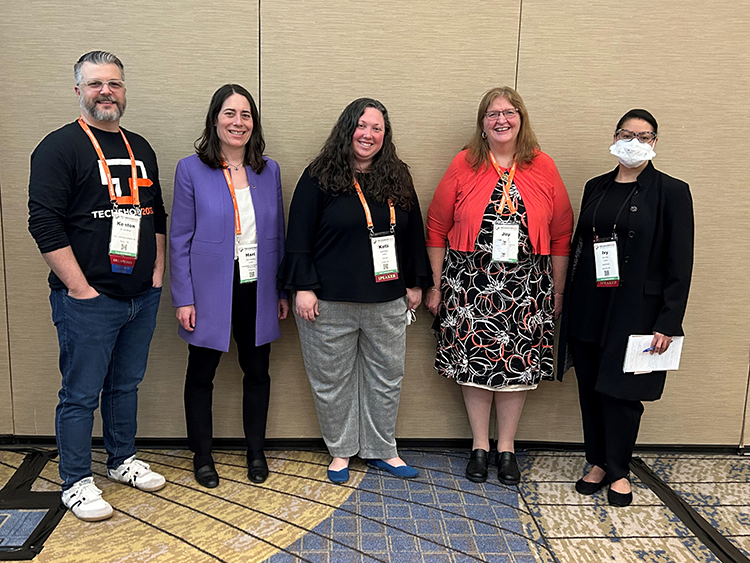How can lawyers meet their ethical obligation to be competent in technology?

If 40 states have implemented an ethical duty of competence in technology, why aren’t lawyers completely technologically competent?
That’s a question Kenton Brice, the director of technology innovation at the University of Oklahoma College of Law, posed to the audience Thursday at ABA Techshow 2023. Brice, who moderated a panel discussion titled, “Technology Competence, It’s Required” posited that lawyers may not know what that means.
According to Model Rule 1.1 of the ABA Model Rules of Professional Conduct: “A lawyer shall provide competent representation to a client. Competent representation requires the legal knowledge, skill, thoroughness and preparation reasonably necessary for the representation.”
In 2012, the ABA House of Delegates voted to amend Comment 8 to Model Rule 1.1 to include explicit guidance on lawyers’ use of technology.
“To maintain the requisite knowledge and skill, a lawyer should keep abreast of changes in the law and its practice, including the benefits and risks associated with relevant technology, engage in continuing study and education and comply with all continuing legal education requirements to which the lawyer is subject,” the comment reads.
While this spurred most states to adopt the revised comment to Rule 1.1, Brice contended that being competent in technology has always been a part of lawyers’ obligations.
“When they made this rule change and adopted this language, the [ABA] actually said this does not impose any new obligations,” he said. “That’s really important. When we think about this, it hasn’t just been a 10-year question. It’s actually been a 100-year question.”
Follow along with the ABA Journal’s coverage of the ABA Techshow 2023 here.
Hari M. Osofsky, the dean and Myra and James Bradwell Professor of Law at Northwestern Pritzker School of Law, said during Thursday’s panel discussion that law schools play a significant role in preparing law students to be technologically competent lawyers. She pointed out that many students also need training in basic technology, such as Microsoft Office, and as a result of the COVID-19 pandemic, they need to know how to participate in court hearings on Zoom.
On the more advanced side, she suggested schools consider how ChatGPT and other language models as well as AI-powered legal research tools and contract analysis tools will impact the practice of law and prepare students for those changes.
“It’s really important that in law schools, we think specifically about interdisciplinary law and tech education,” she said. “We need to really expose students to how these emerging technologies work and how they might come into how they serve clients and use their law degrees.”
 Kenton Brice (from left), Hari Osofsky, Kelli Raker, Joy Heath Rush and Ivy Grey spoke on the “Technology Competence, It’s Required” panel.
Kenton Brice (from left), Hari Osofsky, Kelli Raker, Joy Heath Rush and Ivy Grey spoke on the “Technology Competence, It’s Required” panel.Kelli Raker, the associate program director for law, technology and entrepreneurship programs at Duke University School of Law, added that it’s important for law students to learn how to incorporate a design mindset early in their careers.
“This is a pedagogy that we use with law students to prepare them for a world that is increasingly tech-driven,” Raker said. “Design is something that can be used on systems, on processes, in organizations and when providing legal services. This is really important, because tech is a resource and sometimes when we use it without a design mindset, we actually decide tech is not the right answer.”
Raker said law students and practicing lawyers who have a design mindset can often be more open-minded and imaginative about solving problems with technology.
Ivy B. Grey, the chief strategy and growth officer for WordRake, which provides automated in-line editing software for professionals, told the audience Thursday that lawyers don’t need to know how to code to be considered technologically competent.
While lawyers need to do more than just type on their computers, Grey said using things like default fonts and formatting, tables of contents and forms and templates will prevent them from falling into “the danger zone” and facing sanctions.
“There is this middle ground where you are understanding and applying your technology competency to do the things that you do daily,” Grey said. “If there is crying or anyone missing deadlines, there is probably something wrong with your technology.”
Joy Heath Rush, chief executive officer of the International Legal Technology Association, an organization that provides educational and networking opportunities to lawyers and legal technology professionals, provided some practical ways lawyers can use technology.
She contended that despite common stereotypes, not all young lawyers understand technology and may need training. She suggested that lawyers of all ages know what tools are available to help them with their jobs, even if they don’t know how to use those tools.
These lawyers can ask colleagues, legal technology providers or associations like hers to help them at any time, Rush added.
“There is a reason why competence is an ethical consideration and encouraging the idea of including technology tools and problems into training, whether it’s on the job or in school, is fantastic,” she said.




